Did you know that your Egyptian Mau’s litter box skills are practically hardwired into their DNA? These striking felines don’t just have wild-looking spots; their instincts are wild too! How do you tap into these natural tendencies to make potty training your Egyptian Mau cat a breeze?
Litter training an Egyptian Mau isn’t typically an uphill battle. From a tender age of around four weeks, cats begin to exhibit behaviors passed down from their wild ancestors, like burying their waste to keep predators at bay. Even kittens without a mother cat to show them the ropes will almost always find their way to the litter box.
However, some guidance can still come in handy, especially if your cat is adjusting to a new environment. Creating a setup that aligns with their deeply ingrained habits can expedite the training process. So, let’s explore how to train an Egyptian Mau cat to use a litter box and make this natural behavior work for you!
Key Takeaways
- Egyptian Mau cats have natural instincts for burying their waste due to their wild ancestry.
- Most kittens, including orphaned ones, instinctively adopt these behaviors by around four weeks of age.
- Understanding and leveraging these instincts can simplify the litter training process.
- Aligning the training setup with the cat’s natural behaviors facilitates easier litter training.
- Guidance is particularly helpful during transitions to new environments.
Understanding the Egyptian Mau’s Natural Instincts

The Egyptian Mau, a breed revered for its captivating appearance and keen senses, showcases an array of behaviors tied to its wild ancestry. These natural instincts not only make them unique but also profoundly impact their everyday activities, particularly their proficiency with litter boxes.
The Influence of Wild Ancestry
The Egyptian Mau’s natural instincts are deeply rooted in their genealogical ties with wild cats. Sharing over 95% of their DNA with tigers, these domestic felines exhibit behaviors inherited from their untamed relatives. An essential trait is the habitual burying of their waste to disguise their presence from both predators and potential prey. This wild ancestry influence ensures they naturally gravitate towards litter boxes, as these mimic the soft dirt and sand they would seek in the wild.
The Importance of Burying Waste
Understanding the waste burying habit of the Egyptian Mau provides insight into their highly refined survival strategies. In their wild habitats, masking their scent is crucial for avoiding larger predators and successfully ambushing prey. The Egyptian Mau instinctively carries out this behavior even in a domestic setting. By providing a litter box filled with sand-like substances, you cater to their genetic predispositions, ensuring they continue this critical survival technique in a safe, domestic environment.
Moreover, these natural instincts emphasize the importance of choosing the right litter for your Egyptian Mau, which will be discussed in subsequent sections.
Choosing the Right Litter Box for Your Egyptian Mau
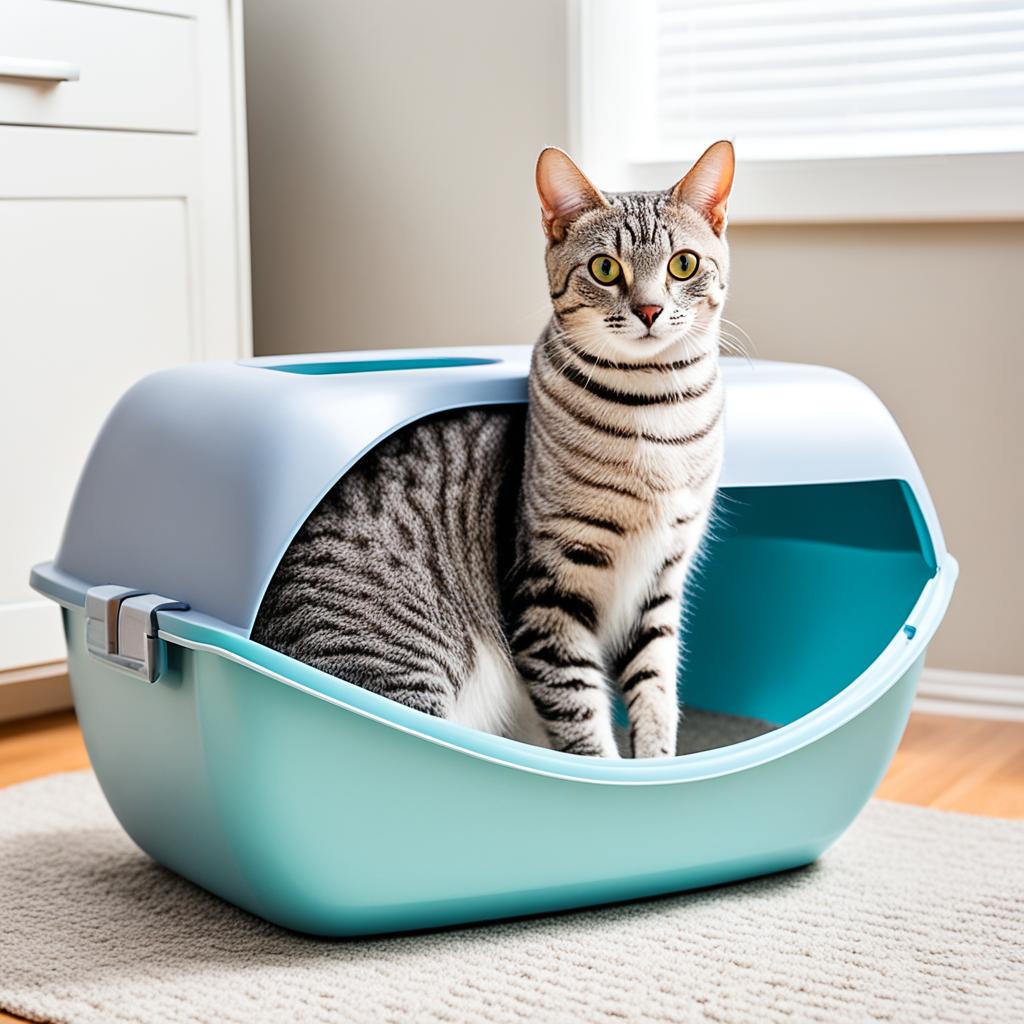
Finding the right litter box for Egyptian Mau cats is essential to ensuring their comfort and adherence to using it. As with many aspects of feline care, this decision encompasses several pivotal factors, including size, type, location, and privacy.
Size and Type of Litter Box
The size of the litter box can significantly impact your Egyptian Mau’s willingness to use it. These medium-built cats need ample space to turn around and bury their waste comfortably. Opt for a litter box that reflects their natural behaviors. If you’re unsure, larger is often better to avoid any feelings of confinement or discomfort.
Location and Privacy Considerations
Privacy is paramount when it comes to litter box placement. For the right litter box privacy setup, choose a location that is quiet and away from high-traffic areas in your home. Cats appreciate having a sense of security while they do their business, which aligns with their instinct to avoid predators. A discreet spot, like a corner in a less frequented room, can work wonders.
Covered vs. Uncovered Litter Boxes
The debate between covered vs. uncovered litter boxes is a common one. Covered litter boxes can provide an added sense of privacy, blocking out visual distractions and helping contain odors. However, some cats prefer uncovered options, as they offer an unobstructed view of their surroundings. Observing your cat’s preferences can help you make the best choice. Sometimes, providing both options initially can reveal which type your Egyptian Mau prefers.
With these considerations, you’ll be better equipped to select the ideal litter box for your Egyptian Mau, fostering a clean and comfortable environment for your beloved feline friend.
How to Train an Egyptian Mau Cat to Use a Litter Box?
Training your Egyptian Mau to use a litter box can be a rewarding experience, especially when employing the right techniques. These cats typically possess a natural inclination toward litter box usage, but a little guidance can ensure success.
Using Positive Reinforcement
One of the most effective strategies to teach an Egyptian Mau to use a litter box is through positive reinforcement. Reward your cat with treats, praise, or affection whenever it uses the litter box correctly. This approach fosters a positive association with the behavior, encouraging your cat to continue using the litter box without the fear of punishment, which can be counterproductive and stress-inducing.
Steps for Introducing the Litter Box
When embarking on the litter box introduction steps, it’s crucial to set your Egyptian Mau up for success. Begin by observing signs that your cat needs to relieve itself, such as sniffing or scratching at the ground. Gently place your cat in the litter box at these times to help it make the connection. Additionally, introduce a litter that mimics natural textures to make the transition smoother for your feline friend.
- Place the Litter Box in a Quiet Spot: Ensure the box is in a low-traffic area to provide privacy and reduce stress.
- Show Them the Way: Gently place your Mau in the box and let them explore it on their own.
- Reinforce the Behavior: As mentioned, always use treats and praise when they use the box correctly.
- Stay Consistent: Stick to a routine and be patient; consistency will help your Egyptian Mau learn more effectively.
By incorporating these techniques, you can successfully teach an Egyptian Mau to use a litter box with minimal hassle. Remember, patience and persistence are key during this training phase!
Best Methods for Egyptian Mau Litter Box Training
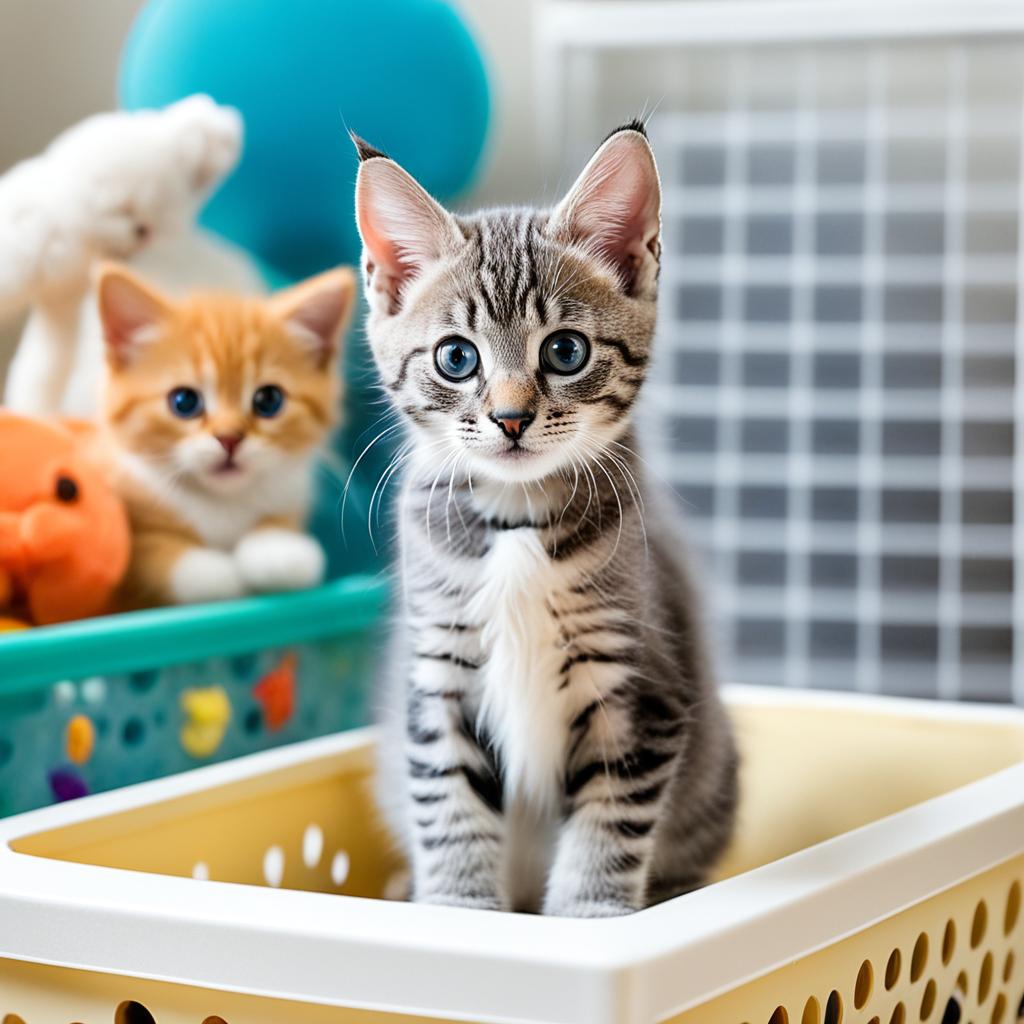
To master Egyptian Mau litter box training methods, understanding and replicating natural behaviors is fundamental. This approach ensures that your cat feels at home and uses the litter box consistently.
Replicating Natural Behaviors
The key to effective training lies in the replication of natural behavior. By providing substrates that resemble soft dirt, such as clumping clay litter, you can tap into your cat’s instincts to bury waste. Observe how your Egyptian Mau interacts with different types of litter to identify what feels most natural to them.
Monitoring and Adjusting Techniques
Routine monitoring of your Egyptian Mau’s litter box habits is essential. Small changes in usage can indicate the need for training adjustments. If you notice any reluctance, try different litter types or adjust the box’s location. Remember, keeping the box clean and sanitary encourages consistent use.
| Training Technique | Why It Works | Adjustments Needed |
|---|---|---|
| Replicating substrate | Mimics natural textures | Monitor for preference |
| Positive reinforcement | Encourages desired behavior | Adapt based on reaction |
| Maintaining cleanliness | Encourages use | Regular inspections |
Tips for Training an Egyptian Mau Kitten to Use a Litter Box
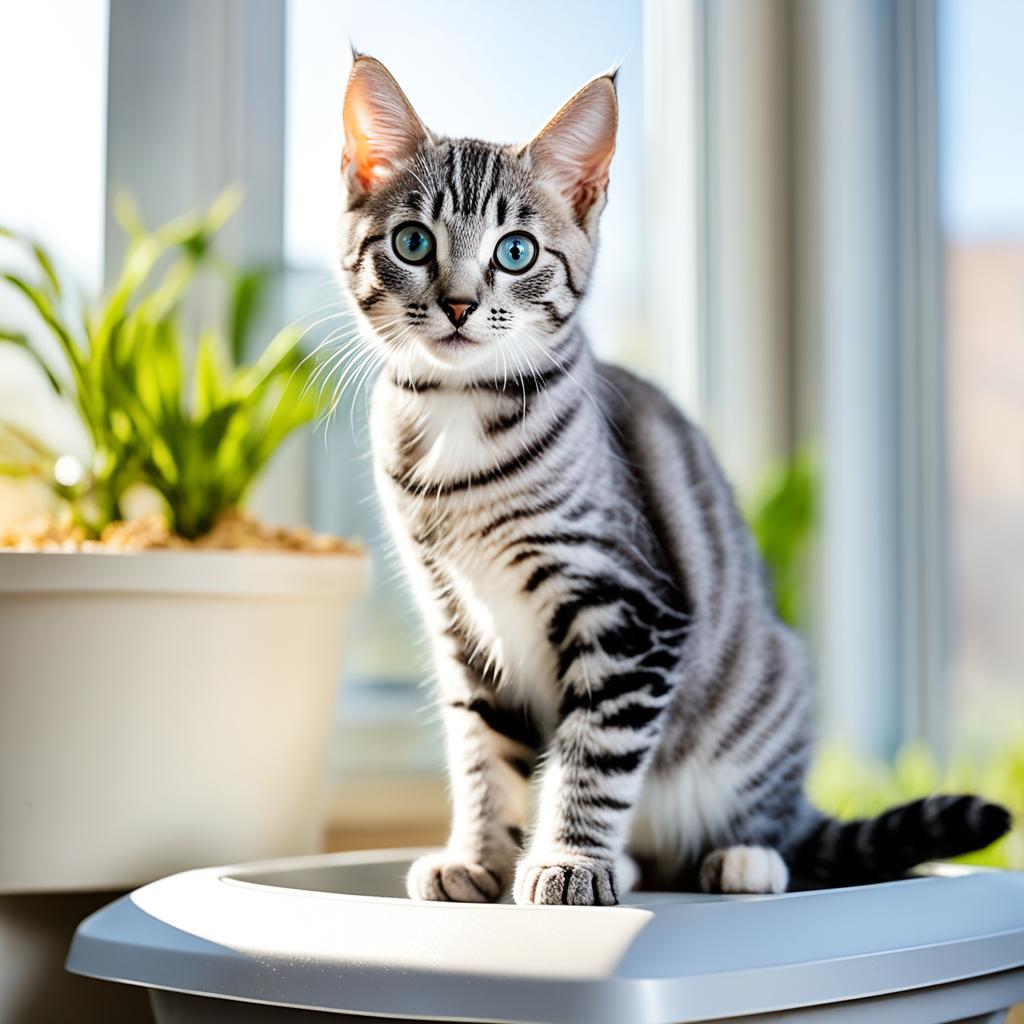
Training an Egyptian Mau kitten to use a litter box can be a delightful process if you follow the right steps and avoid common pitfalls. Cementing these skills early on will ensure a well-acclimated, litter-trained furry friend.
Early Training Techniques
Early litter box training techniques are vital to help your Egyptian Mau kitten develop good habits. Start by introducing the litter box as soon as the kitten displays independence. Using gentle encouragements and rewards, like treats and praise, can make this process much smoother. Remember, the key is to replicate the natural environment your kitten prefers.
Common Mistakes to Avoid
Avoiding litter box training mistakes is crucial for success. Here are a few pointers to keep in mind:
- Don’t punish accidents: Negative reinforcement can create fear and confusion.
- Maintain cleanliness: A dirty litter box can deter usage.
- Provide enough boxes: In multi-cat households, ensure each feline has access to its own litter box.
By focusing on creating a positive and consistent environment, you’ll likely see quick and effective results in training your Egyptian Mau kitten.
Handling Litter Box Challenges
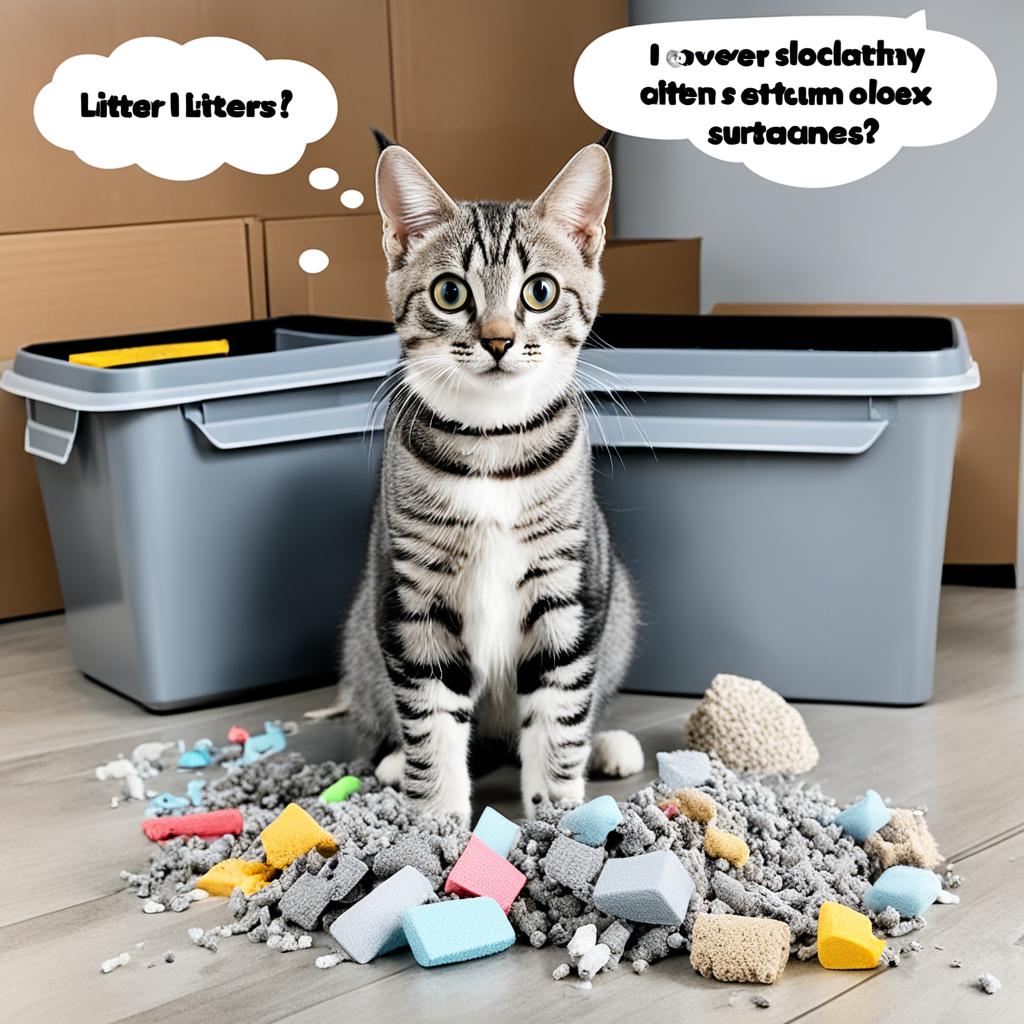
Addressing litter box challenges with your Egyptian Mau can sometimes be tricky but is completely manageable with the right approach. Often, feline aversion to the litter box stems from factors like cleanliness, type of litter, or even stress. Identifying these issues and finding the right litter box challenges solutions will make a world of difference.
Frequent Issues and Solutions
One frequent issue is avoiding the litter box altogether. This can often be attributed to the box not being clean enough, or the litter itself not being to your cat’s liking. Opt for unscented, clumping litter and ensure you clean the box daily. Another problem could be the location of the box. Try placing it in a quieter, more private area.
- Cleanliness: Scoop the litter daily and change it regularly to keep it fresh.
- Type of litter: Experiment with different litters to see what your Mau prefers.
- Location: Ensure the box is in a quiet, low-traffic area for privacy.
- Box Size: Make sure it’s large enough for your cat to move comfortably.
When to Consult a Veterinarian
If these litter box challenges solutions don’t seem to improve the situation, it might be time to consider when to consult a veterinarian. Sudden changes in urination or defecation habits can signal medical issues such as urinary tract infections or other health concerns. Consulting a veterinarian is crucial as medical conditions need prompt attention to ensure your cat’s wellbeing.
By addressing these common problems and knowing when to consult a veterinarian, you can help your Egyptian Mau maintain healthy litter box habits.
Choosing the Right Litter for an Egyptian Mau
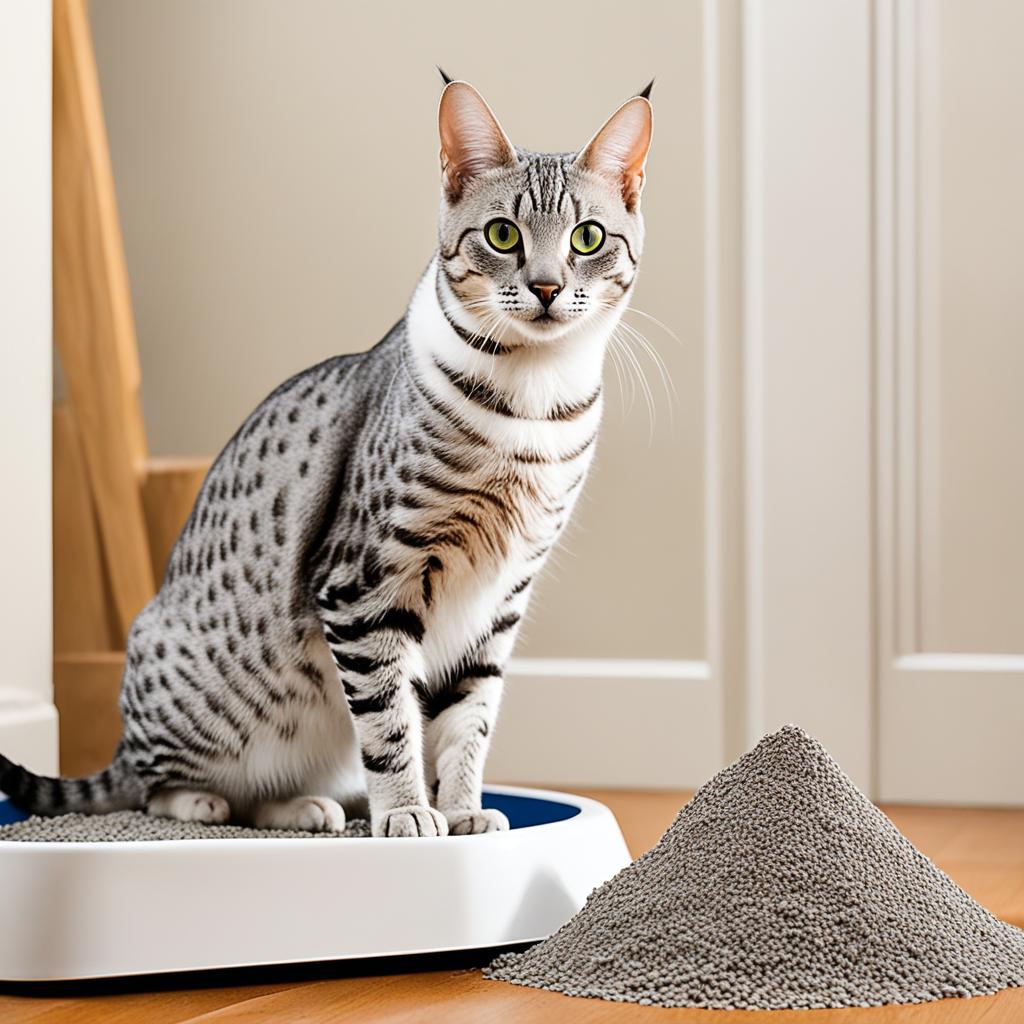
Understanding your Egyptian Mau’s litter preference is crucial for ensuring a smooth and stress-free potty experience. Let’s dive into the types of cat litter, figure out your Mau’s likes, and explore the best methods to transition to a new litter.
Types of Cat Litter
From clumping clay to biodegradable options, the market offers a vast array of choices. Clumping clay litter closely mimics the natural textures your feline friend would encounter in the wild. If you’re eco-conscious, biodegradable litters made from corn, wheat, or recycled paper can be an excellent option.
Understanding Your Mau’s Preferences
Each Egyptian Mau has its unique likes and dislikes. Some may prefer the feel of fine granules under their paws, while others might lean towards scented varieties. Pay attention to your cat, and experiment with small amounts of different types to see which they favor the most. This insight will help you choose the best litter for Egyptian Mau without causing unnecessary stress.
Transitioning to a New Litter
Switching to a new litter can be a delicate process. Using effective litter transition tactics ensures your cat adapts smoothly. Start by mixing a small amount of new litter with the old. Gradually increase the proportion of the new litter over a week or two. This approach minimizes disruption, helping your Mau embrace the new setup comfortably.
Choosing the right litter is a blend of understanding cat’s litter preferences and thoughtful transition strategies. With the right approach, your Egyptian Mau will thank you with a contented purr and consistent litter box habits.
Maintaining a Clean Litter Box Environment
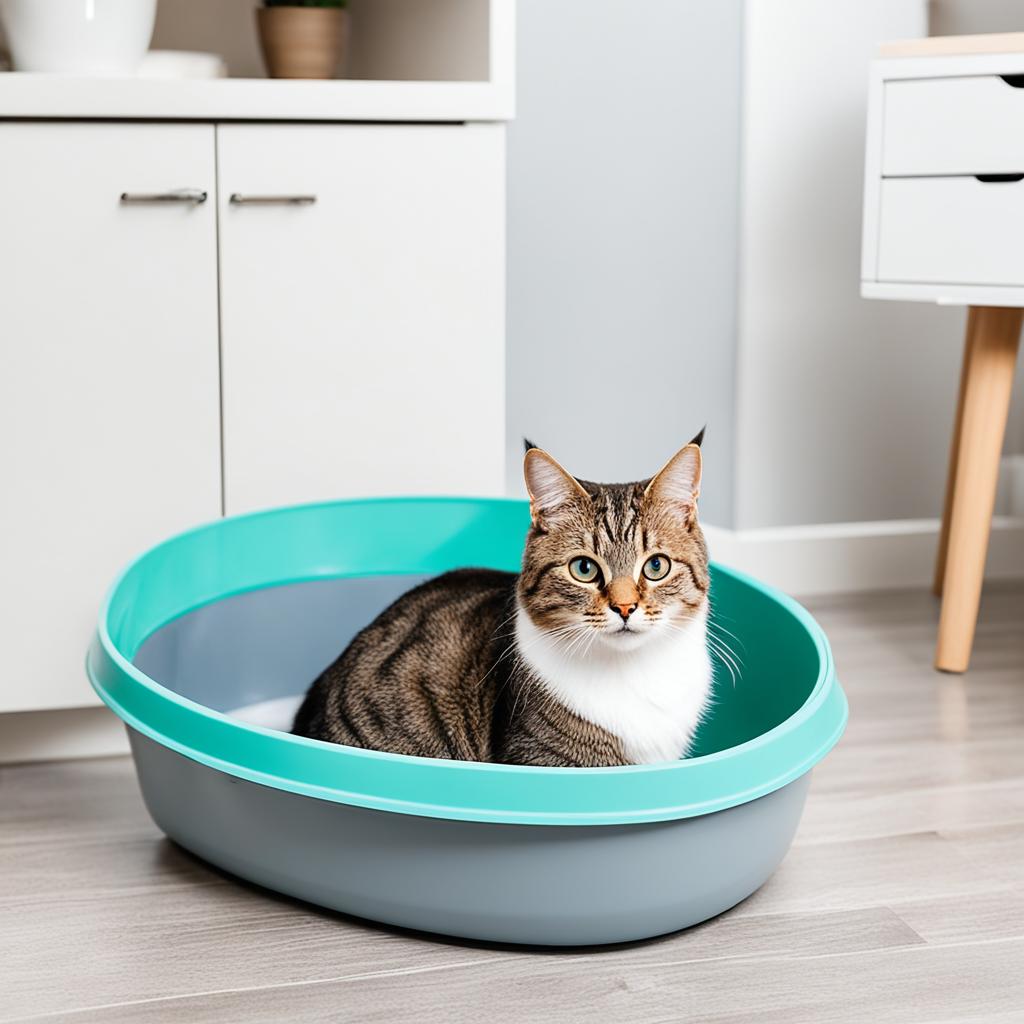
Ensuring your Egyptian Mau consistently uses the litter box involves maintaining a clean litter box environment. Regular upkeep not only promotes hygiene but also keeps your cat happy and healthy. Below are effective strategies for keeping the litter box spotless.
Daily Cleaning Routines
Establish daily cleaning routines to keep the litter box inviting. Scooping waste at least once a day is crucial for maintaining a clean litter box and minimizing odors. Additionally, refreshing the litter to ensure an adequate level of pristine litter is available encourages consistent use.
Monthly Deep Clean Tips
Beyond daily maintenance, a monthly deep clean is essential. This involves completely replacing the litter and thoroughly sanitizing the box. Choose pet-safe cleaning products to avoid any harmful residues that might deter your cat. An enzyme-based cleaner is recommended to break down any lingering odors effectively.
Best Cleaning Products to Use
When choosing cleaning products, go for those specifically designed for pets. Here are some recommended types:
- Enzyme-based cleaners: Excellent for breaking down organic waste and eliminating odors naturally.
- Pet-safe disinfectants: Ensure thorough cleaning without the risk of toxic residues.
- Clumping litter: Facilitates easier daily cleaning routines, maintaining a clean litter box effortlessly.
By following these guidelines, you’re well on your way to creating a pristine and welcoming litter box environment for your Egyptian Mau, ensuring both you and your feline enjoy a harmonious living space.
Addressing Behavioral Issues Related to Litter Box Usage
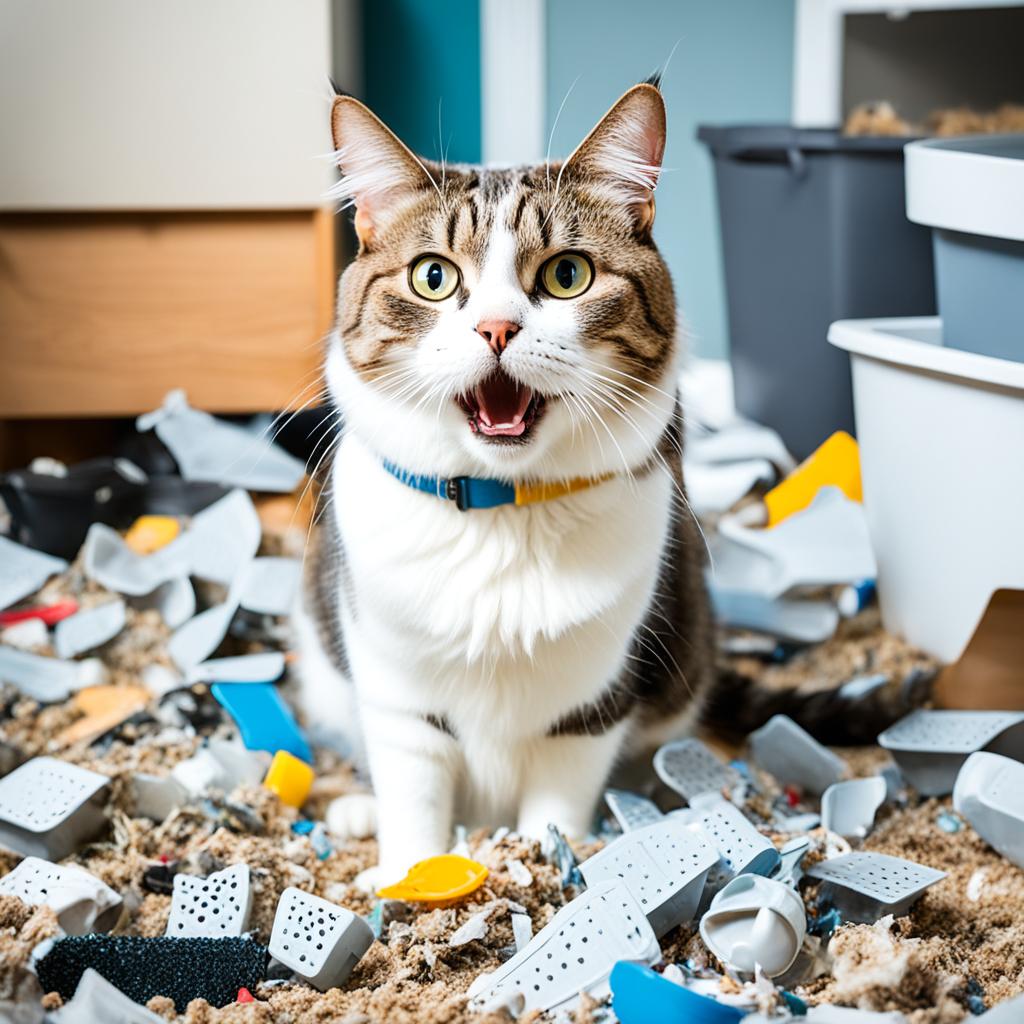
When your Egyptian Mau exhibits behavioral issues related to the litter box, it often stems from stress and anxiety. Recognizing the signs of cat stress promptly can help alleviate these problems.
Signs of Stress and Anxiety
Your feline friend might display several signs of cat stress, such as changes in vocalization, aggression, or eliminating outside the litter box. These symptoms suggest your Egyptian Mau is experiencing discomfort that impacts their behavior.
Creating a Calm Environment
Creating a calm space for your cat is paramount in addressing these behavioral issues and litter box woes. Consider minimizing household changes and furnishing your home with safe hiding spots. Additionally, using pheromone diffusers can substantially help in creating a calm space for cats. These measures promote serenity, making the litter box a stress-free zone.
Recognizing Medical Issues Affecting Litter Box Habits
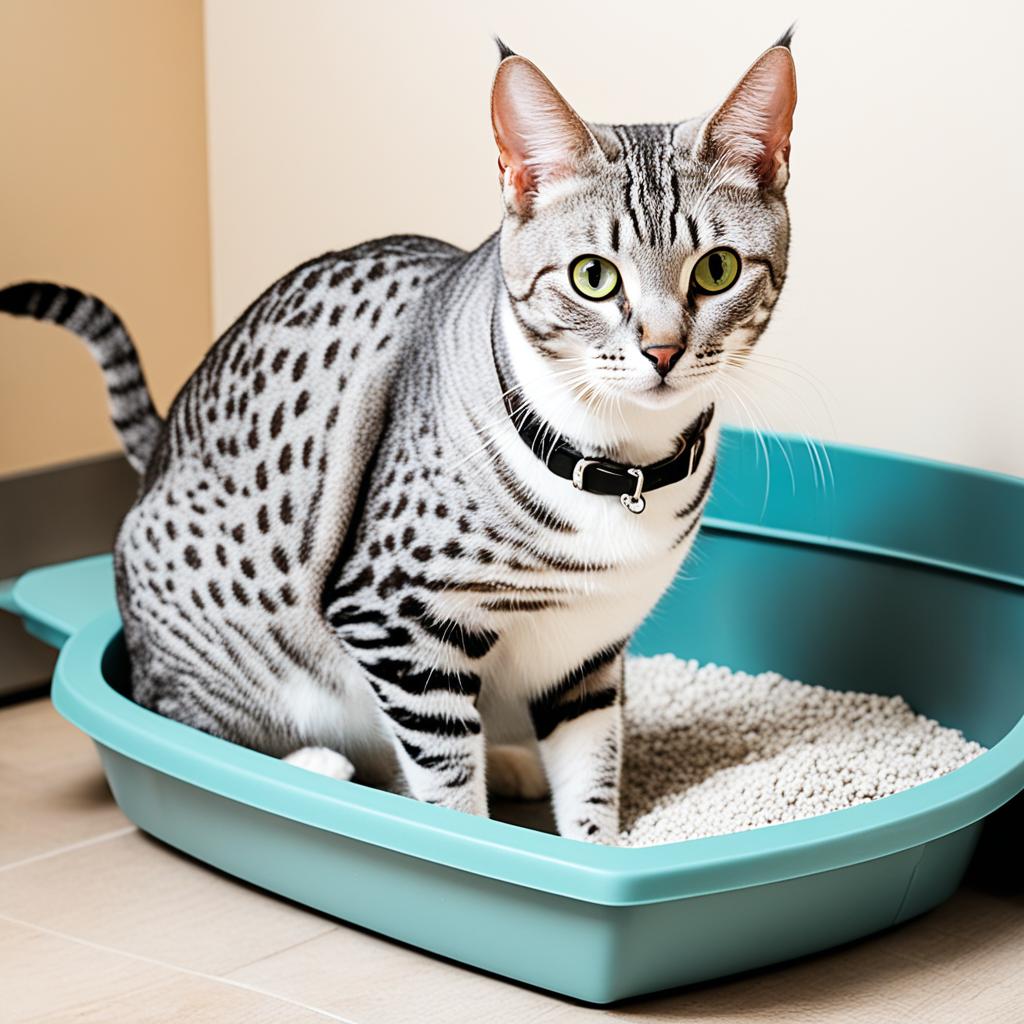
When your Egyptian Mau starts displaying erratic litter box habits, it’s time to investigate potential medical causes. It’s not just about cleanliness; these behaviors can signal underlying issues that need addressing.
Common Health Problems
Several common feline health problems can lead to changes in litter box behavior. For instance, urinary tract infections often cause frequent and painful urination, leading your cat to associate the litter box with discomfort. Gastrointestinal disturbances, such as constipation or diarrhea, can similarly disrupt their routines. Kidney issues may increase urination frequency, causing accidents outside the box. Recognizing these
medical issues affecting litter habits is essential for prompt action and resolution.
Preventive Care and Regular Checkups
Engaging in preventive care is crucial when it comes to maintaining your cat’s health. This includes the importance of regular vet checkups, which can catch issues early before they escalate. Routine exams allow veterinarians to identify subtle symptoms that might go unnoticed, ensuring your Egyptian Mau remains in the best possible health. Regularly monitoring your cat for any behavioral changes or physical symptoms can provide vital information for your vet, helping to tailor a treatment plan
to any arising common feline health problems.
| Health Issue | Symptoms | Preventive Measures |
|---|---|---|
| Urinary Tract Infections | Frequent urination, painful urination, blood in urine | Regular vet checkups, proper hydration |
| Gastrointestinal Disturbances | Diarrhea, constipation, vomiting | Balanced diet, avoid food changes |
| Kidney Issues | Increased urination, lethargy, weight loss | Routine health screenings, maintaining hydration |
Conclusion
Effective Egyptian Mau litter box training truly hinges on grasping and leveraging the natural instincts of these magnificent felines. By setting up an inviting litter box environment that caters to their preferences and maintaining impeccable cleanliness, you play a crucial role in ensuring your cat masters the litter box with ease.
Stay vigilant for any behavioral or health-related issues that might disrupt your Egyptian Mau’s established litter habits. Recognizing early signs of stress or medical problems allows for timely interventions, keeping both you and your feline friend on the right track. Patience, keen observation, and a thorough understanding of your cat’s needs are your best allies in this endeavor.
Incorporating these strategies into your daily routine ensures that your Egyptian Mau achieves successful litter habits, fostering a peaceful and hygienic coexistence. By combining knowledge and attentiveness, you’re setting the stage for a harmonious and stress-free experience for both you and your furry companion.
FAQ
How do I select the right litter box for my Egyptian Mau?
Choosing the right litter box involves considering the size, type, and location. Ensure the box is spacious enough for your Mau to move comfortably and carry out their natural burying behavior. Consider privacy by placing the box in a secluded area and decide between covered or uncovered based on your cat’s preference. Many cats prefer open boxes for better visibility and a sense of security.
What are the natural instincts of an Egyptian Mau that help with litter box training?
Egyptian Maus have strong natural instincts influenced by their wild ancestry, such as burying waste to mask their scent from predators. This behavior originates from their wild ancestors and is typically exhibited around 4 weeks of age. Replicating these natural behaviors by providing litter that mimics soft dirt can greatly aid in training.
How can I use positive reinforcement to train my Egyptian Mau to use the litter box?
Positive reinforcement is key. Observe your Mau for signs they need to go, like sniffing or scratching the ground, and guide them to the litter box. Reward them with treats and praise after successful use to encourage the behavior. Avoid punishment, as it can be counterproductive.
What are the best methods for litter box training an Egyptian Mau?
Effective methods include replicating natural behaviors by using substrates similar to soft dirt, monitoring your Mau’s reactions to different litters, and making adjustments as needed. Consistency, patience, and maintaining a clean litter box environment are crucial for successful training.
Are there specific techniques for training an Egyptian Mau kitten to use a litter box?
Start training your kitten early by introducing the litter box as soon as they begin to show independence. Avoid common mistakes like punishing accidents or neglecting the cleanliness of the box. Consistent positive reinforcement and monitoring your kitten’s preferences will help them adjust smoothly.
How do I handle common litter box challenges with my Egyptian Mau?
Identify the underlying issues, such as cleanliness, litter type, or stress. Make necessary adjustments and consult a veterinarian if medical issues are suspected. A clean and calm environment often resolves most litter box challenges.
What type of litter is best for an Egyptian Mau?
The best litter depends on your Mau’s preferences. Options range from clumping clay, which resembles natural textures, to biodegradable litters. Gradually mix new litter with the current one to ease the transition.
How should I maintain a clean litter box environment for my Egyptian Mau?
Establish a daily routine of scooping waste and refreshing litter. Perform monthly deep cleans by replacing all the litter and thoroughly sanitizing the box with pet-safe products. Use enzyme-based cleaners to eliminate odors effectively.
What are some signs of stress that can affect my Egyptian Mau’s litter box habits?
Signs of stress include changes in vocalization, aggression, and attempts to eliminate outside the litter box. Creating a calm environment with minimal household changes, safe hiding spots, and possibly pheromone diffusers can help alleviate stress-related issues.
What medical issues can affect an Egyptian Mau’s litter box habits?
Common health problems include urinary tract infections, kidney issues, and gastrointestinal disturbances. Regular veterinary checkups and preventive care are essential to identify and treat these issues early, ensuring consistent litter box habits.




